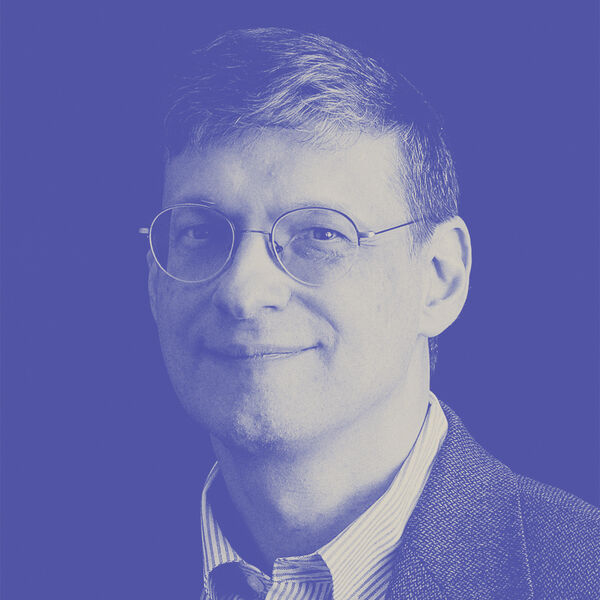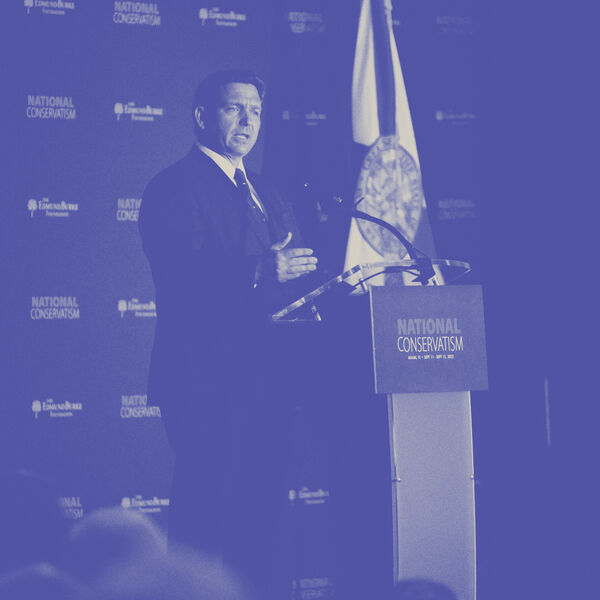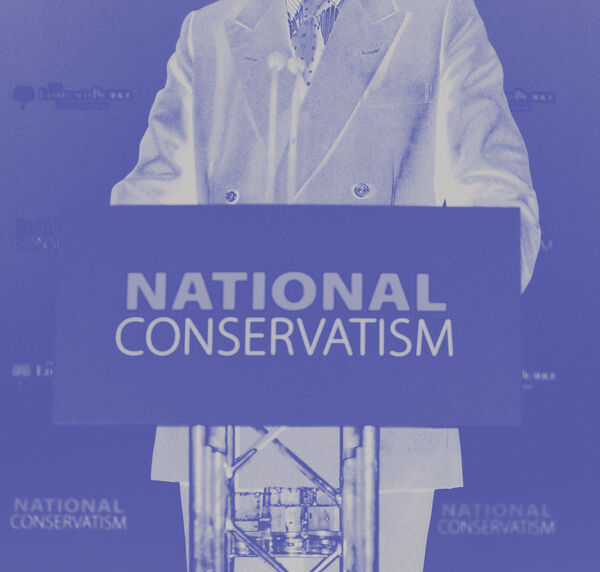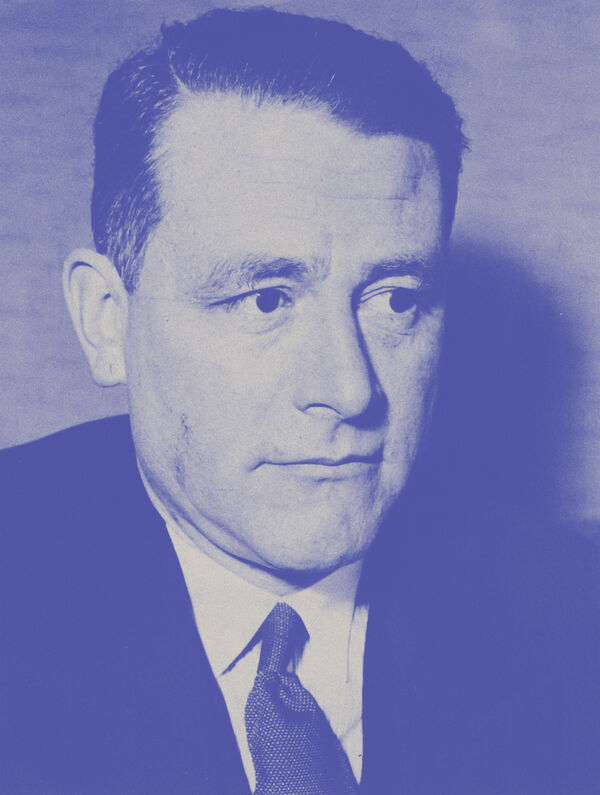Light Among The Nations

For Yoram Hazony, the founder of the National Conservative movement, Israel is an illiberal model for the international nationalist brigade.
When Yoram Hazony took the stage on the first day of the National Conservatism Conference in London on May 15th, he beamed like the class valedictorian. Indeed, with his tousled not-yet-gray hair and Harry Potter-esque glasses, the 59-year-old emits a sort of boyish exuberance. Surveying the audience of a few hundred people, he began his address with a lament: Over the past few decades, Western democracies have been “flooded with . . . this notion that somehow it’s possible to be a globalist conservative . . . a universalist conservative, that the term conservative could somehow be alienated from the idea of home, the idea of family, the idea of congregation, the idea of nation.” Liberal multiculturalism is a dead end, he argued, “ruining Western nations” and bringing “cultural revolution.” Like the jeremiads of the prophets of old, Hazony’s lament came with a glimmer of hope: A “homecoming” is still possible, but only if the wayward people accept that there can be no true conservatism without restoring the nation to a place of honor.
The language of home was not a mere stylistic flourish, but indicated where Hazony believes political identity comes from and what it delivers: rootedness, belonging, and honor, a metaphorical roof over the head of otherwise atomized and troubled souls. As a political philosopher, former speechwriter for Israeli Prime Minister Benjamin Netanyahu, and founder of two right-wing think tanks based in Jerusalem—the Shalem Center (now College) and the Herzl Institute—Hazony has been a fixture of Israeli intellectual and political life since the early 1990s. But he has recently set his sights on something even larger than Zion. Since publishing his landmark The Virtue of Nationalism in 2018 and founding the Edmund Burke Foundation (EBF)—a public affairs institute named for the British statesman and philosopher largely regarded as a founding father of conservatism—in 2019, Hazony has emerged as a key ideologue of the new global right. His movement, which he has dubbed National Conservatism, attempts to redeem nationalism from its genocidal associations by juxtaposing it with imperialism and claiming that the latter is truly to blame for the bloody 20th century.
Political philosophers differentiate between the state as a form of government that can take many shapes, and the nation as an “imagined community” of people that are joined together through shared history, ethnicity, language, religion, or some combination thereof. Crucial to Hazony’s thought is the contention that the fusion of the nation and the state—an innovation often associated with 19th and early 20th-century European nationalism—represents a timeless ideal for all people everywhere. Hazony goes so far as to argue that the Bible prescribes the nation-state as the optimal form of political community. Unlike empires, nations only want to maintain what is unique about their culture and heritage and are thus uninterested in conquest. (The fact that many paradigmatic nation-states were also empires goes largely unremarked upon.) “The nationalism I grew up with,” he writes in The Virtue of Nationalism, “is a principled standpoint that regards the world as governed best when nations are able to chart their own independent course, cultivating their own traditions and pursuing their own interests without interference.” Though careful not to criticize bombastic leaders like Donald Trump, Hazony clearly wants to offer the emerging nationalist movement a more reputable intellectual pedigree—to provide the ascendant global right with a respectable ideological scaffolding it can take home to mother.
NatCon UK was convened by Hazony’s Edmund Burke Foundation, the latest in a string of conferences that have also occurred in Washington, DC, Brussels, Rome, and Miami. The London gathering took place at the Emmanuel Centre in Westminster, a church-qua-conference-center that serves as the home of an evangelical congregation founded in 1989. It was a fitting choice for a decidedly contemporary movement that claims to root its political agenda in the bedrock of age-old national and religious tradition. Inside, smartly dressed Oxbridge students, guests, speakers, and members of the press shuffled about a small exhibition hall where ideologically aligned partners—including think tanks like the Heritage Foundation and the Danube Institute, and publications like The Critic, The Epoch Times, and The European Conservative—handed out literature. I picked up stickers of Margaret Thatcher and Winston Churchill along with a Heritage Foundation pamphlet titled “How to Speak Up About Gender Identity.”
Hazony clearly wants to offer the emerging nationalist movement a more reputable intellectual pedigree—to provide the ascendant global right with a respectable ideological scaffolding it can take home to mother.

Yoram Hazony

Florida Governor Ron DeSantis speaking at the NatCon conference in Miami, 2022

Prime Minister of Hungary Viktor Orbán addresses the National Conservatism conference in Rome, 2020
While National Conservatism purports to represent the interests of everyday people, and families in particular, NatCon UK remained an elite affair. Its lineup of speakers included six British Members of Parliament (including two cabinet members), dozens of prominent conservative writers and intellectuals—from Michael Anton and Douglas Murray to Compact editor Nina Power—and Ohio Senator J.D. Vance over a live video feed. Yet the movement’s champions do have a mass base in mind, and an international one at that—from British Brexiteers and the American patriots who elected Donald Trump to the voters who propelled Giorgia Meloni to power in Italy and buoyed Viktor Orbán in Hungary. American conferences have proved popular with a brand of Republican politicians who paint themselves as culture warriors with intellectual cred: Governor Ron DeSantis, former National Security adviser John Bolton, and Senators Josh Hawley and Ted Cruz. PayPal co-founder Peter Thiel, who poured $30 million into the Senate campaigns of Vance and the venture capitalist Blake Masters, has been a frequent NatCon speaker and is among the movement’s major donors.
Wherever they are, national conservatives emphasize the primacy of the family as the core political unit, the immutability of biological facts, the preservation of borders and boundaries (between countries, between genders), the goodness of national histories no matter how bloody, the need for hierarchy and order, strong militaries, and national economies tailored to serve the needs of the people, not the free market. Above all, they believe in a strong state, one willing to foist their particular understanding of virtue upon a recalcitrant public, to forcibly intervene in social relations via a combination of economic carrots and legislative sticks.
In Hazony’s telling, this orientation represents nothing other than the Anglo-American conservative tradition in its natural, 21st-century iteration: a movement that organically sprouts from the intellectual roots planted centuries ago by the medieval English jurist John Fortescue, and that matured on both sides of the Atlantic in the hands of Burke and George Washington. Per Hazony, theirs was a conservatism that rejected liberalism’s commitment to abstract universalism and confidence in the power of human reason, favoring instead the bedrocks of tradition: family, religion, nation, hierarchy, order. Yet the clearest instantiation today of Hazony’s ideal is neither Donald Trump’s America nor Boris Johnson’s Britain, but the hilltop settlements located deep in the heart of the West Bank: tight-knit communities made up of large, traditional families, united in the face of the enemy, producing legions of young soldiers who have been schooled in the fusion of state violence and spirituality. This is the template that Hazony now offers to the world via the neutralized language of National Conservatism. Like his Zionist predecessors, he too imagines Israel as a light unto the nations—an illiberal model for the international nationalist brigade.
Critics tend to be dismissive of the NatCon movement, but it is important to take stock of what its champions want and why they might succeed. Yes, Hazony’s National Conservatism is fundamentally antidemocratic, and notably welcoming of aspiring authoritarians. But its stinging critiques of neoliberal economic orthodoxies and calls for meaningful support for care work and child-rearing—at least among the movement’s intellectual wing—do have mainstream appeal, perhaps more than many liberals would care to acknowledge. The goal is a new conservative fusionism, marrying ethnic nationalism to militarism and reactionary social values, while adopting, at least in part, left-wing critiques of the neoliberal economic order. The vision is not a new Reich but a global coalition of states that resembles Orbán’s Hungary, Narendra Modi’s India, Jair Bolsonaro’s Brazil, and of course, Netanyahu’s Israel. We can guess what this world would look like because it is, to some degree, already here.

The goal is a new conservative fusionism, marrying ethnic nationalism to militarism and reactionary social values, while
adopting, at least in part, left-wing critiques of the neoliberal economic order.
Over the past two decades, Hazony’s ideas have become mainstream in Israel, helped along by a broader constellation of nascent right-wing Zionist think tanks, advocacy organizations, and funders that aim to steer state policy. After spending two long days at NatCon UK, it became clear to me that, like his hero Theodor Herzl, Hazony is a visionary bearing a blueprint for social and political revolution—one whose greatest strength lies not in the originality or rigor of his thought, but in his organizational prowess. In the NatCon movement, he has created an institutional umbrella for activists and thinkers who far outstrip him in terms of intellectual substance. And frighteningly, his ambitions are global in scale and his political competition much weakened. Indeed, it is only because liberalism has demonstrably failed to deliver widespread human flourishing that National Conservatism can offer itself as a reasonable alternative—or rather, as Hazony argued from the stage in London, the only option. “With every passing month, you are going to become more conservative,” he said, “because there really isn’t any choice.”
Given Hazony’s obsession with the traditional, patriarchal family as the building block of virtuous politics, his own life story suggests ample material for armchair psychologists.
Born in 1964 in Rehovot, Israel, Hazony moved to Princeton as a young child after his father, a physicist, received an appointment in the School of Engineering. In his most recent book, Conservatism: A Rediscovery, published last year, Hazony describes his household as shattered, with his thrice-married father abandoning his “violent and mentally ill mother.” He also notes how typical such broken families were among his adolescent cohort in New Jersey. “In fact, most of my friends in high school had been suffering through the breakup of their families. They handled these hardships badly . . . Few of them ended up married with children of their own.”
Hazony did not come from a particularly religious household but began to inch his way toward Orthodox observance and therefore conservatism—he effectively equates them—during a year spent in Israel following high school. There he frequently visited his aunt and uncle, Orthodox Jews who lived with their six children “in a prefabricated home on a hillside an hour north of Jerusalem”—which is to say, in one of the early West Bank settlements of the 1980s. As he writes in Conservatism’s acknowledgments, “it was in the home of my Uncle Isaac and Aunt Linda that I first learned what it meant to live a conservative life. Everything in this book is ultimately a reflection on the things I learned in my many visits to their home.” His descriptions of the nationalist ideal will ring familiar to anyone who has visited the communities that exist in Israeli religious settlements: lives rooted in the soil of the ancestral homeland, bursting with meaning, defined by the conviction that they are taking part in a political project of cosmic significance.
When Hazony was an undergraduate at Princeton in the early 1980s, Meir Kahane—the infamous Jewish supremacist who had spent time in Israeli prison for plotting to blow up the Dome of the Rock and whose political party, Kach, was banned from Israeli elections for promoting racism—came to speak on campus. Hazony, a young conservative who had been impressed by the ideas of televangelist and reactionary firebrand Jerry Falwell when he visited Princeton the year before, was “mesmerized” by Kahane, as Hazony wrote in an obituary for him in The Jerusalem Post. During the 1970s, Kahane had been arrested for plotting attacks on targets ranging from the Soviet trade office in Manhattan to the Iraqi embassy in Washington, DC, and his 1981 manifesto, They Must Go, made the case for the forceful expulsion of Palestinians. But for Hazony, Kahane’s message was a powerful invitation to “learn about Judaism, move to Israel, stand up and fight for what you believe in.” His talk filled Hazony with a sense of certainty and pride, restoring to him the “belief that Judaism could have truth on its side . . . that we should be proud to wear a kipa and make our stand on the world stage as Jews.”
At Princeton, Hazony fell in love with a woman named Julie Fulton who hailed from a poor family in western Pennsylvania. They bonded over their admiration for Ronald Reagan, George Will, and Commentary, and soon secured a grant from Irving Kristol’s Institute for Educational Affairs to found a magazine called The Princeton Tory, which still spreads the conservative gospel on campus. Julie was not Jewish, but she proved eager to embrace the “old-time religion,” as Hazony writes in Conservatism, undergoing an Orthodox conversion and adopting the Hebrew name Yael. She and Hazony married in Princeton in 1987, and by all accounts have lived out his marital ideal, with nine children and a growing pool of grandchildren to show for it. Following graduation, Hazony pursued a doctorate in political theory at Rutgers University, and in 1989, moved with his young family to help develop Eli, then a fledgling settlement located between Nablus and Ramallah. Today, Eli is home to Bnei David Academy, the first Orthodox preparatory school for the IDF, particularly renowned for the relatively high percentage of its graduates who serve in elite units—a tidy example of the blend of religious conviction and state violence that Hazony evokes in his praise for the virtues of military duty and calls for national service. (He and his family now reside in the Jerusalem settlement of Ramot, a religious community just north of the Green Line that was established in 1974.)
Much like his Republican counterparts in the US, Hazony understands the crucial role of an institutional infrastructure in spurring the circulation of ideas among intellectuals, policy centers, and political actors.

Shalem College, an outgrowth of the Shalem Center, in Jerusalem.
Rather than pursue a traditional academic career, Hazony joined the editorial staff of The Jerusalem Post and began writing speeches for the rising star of the conservative Likud party, Benjamin Netanyahu. He also helped create a new crop of Zionist institutions. Much like his Republican counterparts in the United States, Hazony understands the crucial role of an institutional infrastructure in spurring the circulation of ideas among intellectuals, policy centers, and political actors. Together with political scientist Daniel Polisar, a Princeton classmate, he founded the Shalem Center, a conservative think tank and educational institute dedicated to the study of Jewish history, Zionism, and politics. (Early funders included Ronald Lauder, Sheldon Adelson, and Zalman Bernstein, founder of the Tikvah Fund, which has emerged as the premier funder of right-wing Zionist activism in both Israel and the US, and is infamous for its role in the current gutting of the Israeli Supreme Court.) In the heady days of the Oslo Accords, when many liberals believed a two-state solution was imminent, Shalem served as a vehicle to double down on a nationalist project premised on Jewish control over the whole of occupied Palestine and the rejection of Palestinian statehood, a vision it promoted via right-wing educational programs, publications, and policy advice. Amid talk of “post-Zionism” within Israel’s intellectual circles, its mission statement declared that “the entire Jewish people is suffering from an identity crisis.” Its quarterly journal Azure aimed to answer this crisis with a much-needed intellectual framework for the Israeli right, which, as Hazony wrote in the inaugural issue, had “no tradition of intellectual discourse to speak of.”
The Shalem platform in the 1990s and early 2000s married the rejection of prospective Palestinian statehood to hawkish foreign policy and calls for economic liberalization. Netanyahu’s first electoral victory in 1996 offered a way to translate this platform into reality, and in 2009, journalist Ofri Ilany remarked that “there is no think tank today with as much influence on the Israeli government as the Shalem Center.” Numerous Shalem fellows assumed government posts, including economist Omer Moav (who headed the Israeli Finance Ministry’s Council of Economic Advisers), historian Michael Oren (later the Israeli ambassador to the United States), and former IDF chief Moshe Ya’alon (who served as Defense Minister from 2013 to 2016). Today Shalem College, the institution that grew out of the center, boasts that its alumni network includes “a senior advisor to Israel’s ambassador to the United Nations, and a senior press officer at the Israeli embassy in London,” along with other leaders.
Hazony departed Shalem in 2013 to found the Herzl Institute, where he continues to serve as president. While Shalem brought the canon of European philosophy into conversation with Jewish sources, the Herzl Institute took the opposite approach, offering Jewish wisdom to the world at large. The institute particularly intended to forge stronger ties with Christian leaders for reasons both ideological and strategic. It is not merely that Hazony sees Israel as representing an outpost of civilization amid a sea of Eastern barbarism (he has expressed his hopes that “Christian-Arab communities in and around Israel will be able to free themselves from the fear of Muslim fanaticism and enter into a relationship of mutual respect and genuine peace with the Jewish state”); he also regards the Hebrew scriptures as a foundational source for the Western political tradition. This elision of difference between the Judeo and the Christian does crucial political work, as Hazony understands that Israel remains deeply dependent on Christian support in the West. This is one way to explain the choice of David Brog, the Jewish former executive director of the evangelical lobby group Christians United for Israel, as the president of EBF. But the symbiosis is not purely pragmatic. Hazony argues that the West needs Israel too, to serve as a spiritual model for nations that have lost their way. As he stated in a 2019 speech at the Jewish Leadership Conference, the Christian world is in crisis and its leaders are increasingly looking to Israel for answers: “In every country in the world where there is an uprising against the destruction, the endless revolution that liberal Enlightenment is causing . . . the nationalist leadership turns to Israel, turns to the Jews, turns to the Torah, and says ‘That’s our model for what we want to see in our country.’”
“In every country in the world where there is an uprising against the destruction . . . that liberal Enlightenment is causing . . . the nationalist leadership turns to Israel, turns to the Jews, turns to the Torah, and says ‘That’s our model for what we want to see in our country.’”

An Israeli settler family examines a sniper rifle in an army weapons display at Gush Etzion Industrial Park in the West Bank, May 5th, 2022.
Hazony’s latest endeavor, the Edmund Burke Foundation, should be understood as a vehicle for taking the show on the road. Indeed, the overlap of key players between the Herzl Institute and EBF underscores that EBF is the heir apparent, tasked with bringing its founder’s message to a global audience. As the prophet of National Conservatism, Hazony deploys familiar themes of breakdown and renewal. Yet it is no longer just Israeli Jews, but people across the world who, in the view of National Conservatives, are suffering from an identity crisis. In Britain, as Hazony told the crowd in London, the crisis began with liberal attacks on God and scripture, continued with the destruction of British independence (via EU membership), then culminated in the debasement of the nuclear family, military service, and the value of having children. “Cultural revolution, this woke neo-Marxism,” he declared, destroys everything that is great and unique about the countries it overtakes.
Hazony’s break with liberalism grows out of the way he answers a fundamental question: What is it that drives humans to form and maintain political communities? In his view, such communities are not the product of individuals coming together to embrace a common cause, as liberal thinkers like Jean-Jacques Rousseau would have it, but are rather an extension of the family and tribe. These concentric circles of concern extend eventually to embrace the whole nation—yet strangely never exceed its bounds. According to Hazony, ideals like individual freedom, voluntary commitment, rational calculation, and public deliberation are wholly out of place in the family and, by extension, the state. Rather, he centers a different set of political virtues: “loyalty, devotion, and constraint.” His critique of individualism as egoistic and atomizing, leading to the disintegration of the common good, overlaps with that of many leftists as well as those influenced by Catholic social thought. Yet he understands the path forward very differently, underscoring that his is a reactionary rather than an emancipatory project: Individuals must abandon their selfish pursuits and embrace strict gender norms, marry early, have many children, join a congregation, and fight to preserve the nation-state. As he argues in The Virtue of Nationalism, Jews living in the United States may have had individual rights before 1948, but they lacked true freedom until the State of Israel was born and Jews as a national collective secured the reins of power. As he rhetorically asked from the stage in London, “What’s the point of having freedom if you’ve lost the ability to use it for anything that is truly worthwhile, honorable, sacred—what’s the point?”
History, in Hazony’s hands, is the handmaiden of theology, which helps explain how he allows himself to imagine nationalism as a historical constant rather than a modern invention: In his view, the nation-state is a divine creation, a political form that appears as far back as the Hebrew Bible. The Tower of Babel, he writes in The Virtue of Nationalism, was humanity’s first imperial project—an attempt to create a universal political community, which God rebuffs by splintering peoples into separate groups. A master of projection, Hazony imagines ancient Athens and the Kingdom of Israel as templates for the modern nation-state. This faux continuity anchors his claim that the nation precedes the state, and permits him, in recounting the history of nationalism, to ignore the crucial work done by state institutions (schools, road and rail networks, newspapers, armies) to foster a sense of national identity. This was certainly the case in Israel, where a demonstrable national movement did exist prior to formal sovereignty, but still required quasi-state institutions—especially schools—to create “dor ahid,” a unified generation stripped of its varying diasporic markers. There is nothing “natural” about identification with the modern nation-state, a fact that Hazony must recognize at least in part: Otherwise, there would be no need to direct the strong arm of the state to engendering such loyalties.
Given these commitments, it is not surprising that Hazony has long supported a maximalist vision of the Jewish state. Palestinians, in Hazony’s schema, are not members of a competing nation who—per the logic of nationalism—deserve a state of their own, but impediments to the realization of the Jewish national destiny. (He has opposed Israeli annexation of the West Bank, but only for strategic reasons—as he wrote in Azure in 2003, “Israel’s Jewish population is not nearly large enough to make the incorporation of these Palestinian-Arab populations into the Israeli polity feasible.”) As Hazony argued in The Virtue of Nationalism, minority communities can only be tolerated by acknowledging the absolute hegemony of the majority group. And in an argument that seems custom made for the Palestinians, he also concedes that he does not favor universal self-determination; each people’s case must be weighed “only in the balance of moral and prudential considerations.”
Consistent with this analysis, Hazony and his allies favor permanent legal inferiority for Palestinians, which is why he is so adamant that Israel cannot accept any sort of “universal constitution” built upon equality before the law. He enthusiastically supported Israel’s 2018 nation-state law, which held that “the State of Israel is the nation state of the Jewish People” alone, giving them exclusive rights to self-determination in the land. In a 2018 article, he lamented Israeli Supreme Court rulings that held that “equality (and not also security, liberty, the well-being of the Jewish people, and other values) is the general purpose of Israeli law,” arguing that the nation-state law was a necessary corrective. The Jewish state, if it was to remain thus, would have to embrace discrimination as the basis of its legal regime. When Hazony inveighs in Conservatism against the liberal constitutional model, rejecting ideas like universal human rights in favor of a constitutional tradition tailored to national needs and perfected through “trial and error,” we can surmise he is hunting for philosophical footing for this inequitable legal order. At times, it seems that the ideological arguments that Hazony advances are ex post facto justifications for policies that have long existed within Israel. Thus if we want a glimpse of Hazony’s vision in action, we might look no further than Israel’s precipitous slide toward full-blown authoritarianism—the dismantling of its internal checks and balances, and the acceleration of its project of Palestinian dispossession.
The awkward resemblance between National Conservatism and national socialism, beginning with their names, has not been lost on NatCon’s adherents. When I spoke with a professor of political thought who attended the London conference, he lamented this as a branding failure of the highest order. The Daily Telegraph columnist Tim Stanley opened his remarks by dismissing this resonance on the grounds that Hazony, the man who coined the name, is himself an Israeli. The political commentator Douglas Murray, who is an editor at the conservative magazine The Spectator, similarly defended the name at the gathering, noting that even if the Third Reich had “mucked up” a bit, there was nothing inherently wrong with nationalism.

Carl Schmitt
It’s clear to any student of politics that Hazony’s own work is suffused with the ideas of the German jurist Carl Schmitt, who achieved infamy as the legal architect of national socialism. Schmitt, too, rejected liberal constitutionalism in favor of a strong sovereign who would decide when the law was useful. His notion of agonism, wherein all politics is an unending struggle between “friends” and “enemies,” clearly shapes Hazony’s understanding of the national community. But, perhaps wisely, Hazony never cites Schmitt, instead placing himself in the conservative tradition of Burke, Churchill, and Thatcher. These names were constantly on the lips of the speakers at NatCon UK, even as they advanced policies that would have driven some of these supposed predecessors into a blind rage: economic protectionism, expanded welfare benefits, and greater state intervention into education, housing, and the private lives of families. But if Hazony’s account of his own conservative lineage is unconvincing, this may not be a serious failing. What NatCon offers is a chance to reshuffle and reassemble platforms and priorities—to create a new amalgam, unruly perhaps, but potentially more attractive than anything the neoliberal center has been able to provide. If Donald Trump’s attempt to advance a new conservatism in the US proved unsuccessful because he was unable or unwilling to break with the needs of wealthy Republican interests, National Conservatism gives the next generation of leaders a way forward.
It was the so-called crisis of the family—and the proactive role of the state in resolving it—that united many of the NatCon participants. Their proposals underscored that the culture war is in fact a biopolitical war. Speakers like the self-described “reactionary feminist” Mary Harrington described gender transition, birth control, abortion, surrogacy, and assisted suicide as instantiations of a disregard for the body in its “natural” state. References to “gender ideology” abounded, while UK Home Secretary and Tory firebrand Suella Braverman embraced “unfashionable facts,” like “100% of women do not have a penis.” Hazony, for his part, told the audience that “having children is the greatest thing a woman can do,” in keeping with his belief that the values that prevail in patriarchal domestic spaces are the preeminent political virtues. As in Orthodox Judaism, the idea is not that the sexes are unequal, but that they are essentially distinct and preside over different realms: women oversee hearth and home, while men busy themselves with work and daily prayer. Everyone has a clearly delineated role to play—which is why trans people pose such an existential threat.
To counter all that threatens the family, NatCon speakers argued that national conservatives must “take the politics of the body seriously and govern it at the national scale,” as Harrington put it. She cited approvingly the right-wing governments of Italy and Hungary, which have outlawed surrogacy, refused legal gender recognition for transgender people, and placed stricter limits on abortion access. Speakers floated numerous ideas of how the state could trigger a baby boom, from encouraging a reassessment of no-fault divorce, which enables couples to legally separate without claims of abuse or infidelity, to advocating for limited access to contraception and abortion. But they also championed a bevy of social welfare reforms: expanding parental leave, padding tax benefits for families, and building new social housing. In other words, they advocated breaking with the precepts of neoliberalism, which many NatCon attendees believe have eroded the family as a social form; the Catholic writer Tim Stanley was among several speakers to suggest parting ways with Thatcherite economic principles, noting that “If we want people to live like good conservatives . . . we have to create the material conditions under which they
can afford to do it.” MP Miriam Cates recommended increased investment in “strategic industries that provide good jobs and economic prosperity to young men,” which would free their wives to care for a family.
Speakers at NatCon championed a bevy of social welfare reforms: expanding parental leave, padding tax benefits for families, and building new social housing.

Family life in the Israeli settlement of Eli, 2009.

Conference speakers not only lambasted the legacy of Thatcherism (one young person I spoke to there jokingly suggested burning her effigy), but quoted from the Communist Manifesto to explain capitalism’s degrading effects on the traditional family structure. MP Danny Kruger, in a speech that insisted families must be “at the heart of the fiscal system,” remarked that “Marx was right” when he wrote that “capitalism causes all that is solid to melt into air.” Nina Power, a senior editor at Compact—a new magazine that agitates “against a libertine left and a libertarian right”—favorably cited Marx and Engels’s philosophical treatise The German Ideology. One young attendee went so far as to ask, “If we are challenging liberalism then aren’t we standing up for the working class? Isn’t conservatism the new Marxism?” Marx’s wasn’t the only name uttered that would be unlikely to come up at a mainstream conservative conference like CPAC: Attendees also made reference to economist Adam Tooze, author and progressive activist Barbara Ehrenreich, and 19th-century artist and socialist William Morris. When journalist Louise Perry called for a “feminism orientated towards care and interdependency” that resurrected customs like “lying in” (in which mothers and newborns were cared for post-partum by friends and relatives for up to 40 days), I found myself unnervingly close to applause.
The NatCon fixation on demographics and birth rates, however, is bound tightly to its adherents’ opposition to immigration. Newcomers might stave off economic collapse, but they dilute the national character. As Eric Kaufmann, professor of politics at Birkbeck, University of London, argued in his address, conservative nationalists of all races support “reducing immigration to slow down the rate of ethnic change.” Finally, one can see how all the pieces fit together: If the political community is bound by blood and tradition, and true freedom is only realized when the nation aligns with the state, immigrants and other “outsiders” are by definition an existential threat. Ship them to Rwanda. Tear down their villages. Do not acknowledge the pull of common humanity. Though Hazony claims that National Conservatism, unlike liberalism or Marxism, is not “a universal theory, which purports to prescribe the true politics for every nation, at every time and place in history,” his followers, wherever they are, unfailingly align on these basic values.
At the same time, National Conservatism does face opposition from some corners of the global right. While state support for social reproduction has significant mainstream appeal, such policies remain out of favor with conservatives still preaching the gospel of low taxes, less welfare, and free trade. This economic reorientation is a major source of tension within the NatCon movement, and likely represents its greatest hurdle to making inroads with conservative donors. MP Jacob Rees-Mogg—aligned with his fellow NatCon UK speakers on anti-trans and anti-immigrant policies—was among the speakers trying to thread the needle, arguing that National Conservatism still adhered to the classic Tory economic platform; none of the young people I spoke with at the conference were convinced by his efforts.
The movement’s religious framework also falls flat at times, even among likely sympathizers. In Commentary, conservative writer Brian Stewart notes that Hazony’s National Conservatism has “a distinctly foreign ring” to it, and that the theological solutions he proposes (like imposing religion on public schools) undermine the American traditions he claims to respect. Indeed, Hazony argued in Conservatism that the “absence of any explicit mention of religion” in the US Constitution was a mistake, since “cultivation of the national religion is an indispensable purpose of government.” The idea of a national religion actively promulgated by the state, Stewart writes, would mean “local religious minorities extracting what they could from the Christian majority—and suffering what they had to.” As Stewart points out, it would entail overturning a tradition of religious freedom that dates back to George Washington’s 1790 letter to the Touro Synagogue in Newport, Rhode Island, which explicitly rejected the “tolerance” paradigm in favor of something more robust. It is one thing to call for overthrowing the Establishment Clause, Hazony’s skeptics have suggested—but quite another to claim that doing so represents a path back to the American tradition.
If some American critics see Hazony’s ideas as foreign, British conservatives like the writer Marc Sidwell have made the reverse claim, repudiating Hazony’s conservatism as an American import—a refrain that I heard repeatedly from conventional Tories aghast at NatCon’s London gathering. “No doubt it all sounds more convincing in America,” where there is no official state religion, Sidwell wrote in the conservative British outlet The Critic, but “in the UK—where we have a state church, enforced acts of worship in schools and collapsing public religiosity—it’s less clear that more government power and less freedom is the fix Hazony would like it to be.” Samuel Rubinstein, in the same magazine, sensed “that something alien to what we might call the British tradition is afoot” in the NatCon movement. Of the ideology’s supposed Anglo-American political roots, Rubinstein writes: “It is a strange rescue mission that seeks to salvage from the rubble something that never really existed.”
The reason Hazony’s prescriptions feel at odds with existing conservatism in either the US or the UK is that they were cast from the mold of religious Zionism.
Much of the genealogical confusion subsides if you remember that what Hazony offers as a global template is none other than the blueprints for the Jewish state in its most reactionary and exclusionary form. The reason his prescriptions feel at odds with actually existing conservatism in either the US or the UK is that they were cast from the mold of religious Zionism, and thus reflect everything from its belief that the state is obligated to uphold and enforce the religious norms of the nation, to its insistence on the innate cohesiveness of the national community. But Hazony’s “tradition” presents as a particularly emaciated one, with little to say about Judaism except as a mode of politics. In a fascinating review of The Virtue of Nationalism, Rabbi Meir Y. Soloveichik, who led the 2012 Republican National Convention in prayer, rebuked Hazony’s view of the nation as an end in and of itself, writing that Jews’ “dedication to the Jewish nation should ultimately be an extension of their dedication to the Torah, not the reverse.” Another critic, the historian Derek Penslar, noted in a 2001 review of Hazony’s The Jewish State: The Struggle for Israel’s Soul that, in Hazony’s framework, “the state replaces the transcendent God as being both its own cause and purpose,” a substitution redolent of idol worship. Penslar argues that despite his devotion to Herzl (and unconvincing attempt to recast this adamantly secular figure as a religious Zionist forebear), this orientation places Hazony firmly in the ideological lineage of Revisionist Zionists like Uri Zvi Greenberg and Vladamir Jabotinsky, whose militaristic nationalism stressed “eternal sacrifice and struggle, and a monistic fetishization of the state.” Like theirs, Hazony’s idea of the nation “conjures up a single, omnipotent, irresistible force that hurls the Jews together and pushes them into confrontation with their enemies.” National Conservatism is thus revealed not as a preservationist movement, seeking to protect what is unique about each nation, but rather a revolutionary one, attempting to cultivate its particular brand of blood-and-soil nationalism wherever it finds a foothold.
This vision of state and society may have its attractions for those who lament modernity’s lack of meaning, but Israel as a template remains a hard sell to those who associate the Jewish state with perpetual war and turmoil. Currently, Israel is not only at war with those it occupies—exercising Jewish supremacist rule between the river and the sea over a population that is half Palestinian—but also with itself, embroiled in conflict over constitutionalism, the Supreme Court, and myriad corruption scandals. The ongoing cleavages that divide Jews—separating secular and religious people, Ashkenazim and Mizrahim, settlers and their critics—make any claims of national unity fictitious. The only thing that inspires consensus, albeit temporarily, is war—which the most recent bombing of Gaza demonstrated with bloody clarity. In truth, it’s unclear whether Jewish national cohesion would survive in the absence of an external enemy, which casts the impossibility of peacemaking in a new light: Jewish nationalism needs the Palestinians to hover at the margins as an ever-present existential threat. For Hazony, if liberal opinion has turned against Israel after decades of Palestinian dispossession and occupation, it must be liberalism that is to blame. And he understands better than most that international support for Israel’s status quo cannot be secured other than by contesting the virtues of liberal democracy itself. National Conservatism is the engine for this global project of social and political engineering.
National Conservatism’s champions are quick to rebuke any association with fascism, and indeed, those expecting to find Oxbridge students goose-stepping in London were sorely disappointed. But we badly underestimate the threat this movement represents by measuring it against yardsticks built by Mussolini a century ago. NatCon, to my mind, offers this century’s most serious challenge to liberal democracy—one whose chances of success are directly correlated with the failures of liberalism itself. If the latter has bequeathed us not only expanded rights for women, racial minorities, and the LGBTQ community, it has also stuck us with gaping economic inequality, wage stagnation, declining life expectancy, and staggering costs for education, health care, and housing. Yet I would contend that, whatever structural limitations are inherent in a system built around the recognition of individual rights, you will miss them when they’re gone. So too, Hazony’s vision of a more flexible constitutional order is most likely to be used, as has been the case in Israel, to legalize the dehumanization of one’s “enemies.”
NatCon offers this century’s most serious challenge to liberal democracy—one whose chances of success are directly correlated to the failures of liberalism itself.
In the final paragraphs of his obituary for Meir Kahane, Hazony qualified his adoration by clarifying that he never adopted Kahane’s political views or violent tactics. Yet this is arguably a distinction without much difference: If you regard Jews as the only group with the (divine) right to dwell in Israel/Palestine, and believe that colonizing the West Bank is the natural expression of your Jewishness, sooner or later you will come back to the “solutions” Kahane offered more than 40 years ago. Persistent violence by both state and state-adjacent actors in the name of upholding national integrity—along the lines of settler pogroms in the West Bank or anti-Muslim attacks in India—will be folded into the architecture of a legal framework built upon the right to discriminate.
The real danger of National Conservatism is that there are enormous portions of the population that will not feel the sting of such measures at all. EBF’s UK chairman James Orr referenced this big-tent attitude in his opening remarks at the London conference, noting that National Conservatism has a “place of honor” in its coalition for many types of people—from “liberals appalled at the carnage of liberalism” to socialists “critical of the fact that the left has abandoned the working class” and the “gender critical feminist who has no space in the new left.” Of course, there are many people who fall outside the tent, and whose absolute otherness is decried by those within as an existential threat. For those of us who exist as majority populations, who are straight and cisgender, whose everyday preoccupations track rising childcare costs more than debates within constitutionalism, National Conservatism has much to offer, albeit at horrific cost to Others of various kinds. The real danger, perhaps best exemplified by Jewish Israelis going about their business with nary a thought of the occupation, is that many people will find that’s a deal they can live with.
Suzanne Schneider is a historian, writer, and core faculty member at the Brooklyn Institute for Social Research. She is the author of Mandatory Separation: Religion, Education, and Mass Politics in Palestine and The Apocalypse and the End of History: Modern Jihad and the Crisis of Liberalism.

